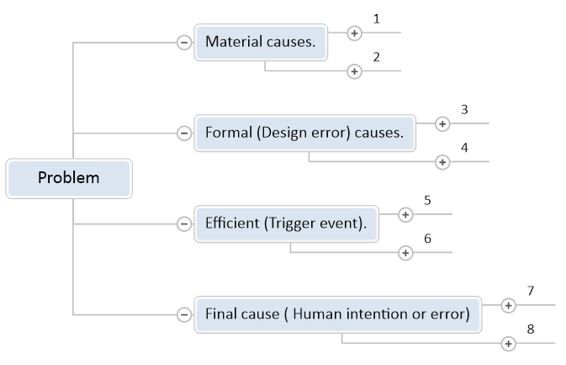Why Do Things Happen?
Why Do Things Happen?
Things don't "just happen". Every event has multiple causes, which can be classified into four different types: Material, formal, efficient and final
1. Material cause
The material cause is the nature of the substances from which the objects taking part in the event are made. For example, the material cause of a house fire would include the materials which were present in the rooms. If the materials were made of steel, then the result would be different than if the materials were made of polystyrene.
Aristotle called the materials involved in an event: the Material cause.
2. Formal cause - Design
The formal cause of an event is the design or the natural structure (or form) of the things taking part in the event. If the form is inconsistent with the function, then a problem occurs.
For example: If a room is designed without sufficient ventilation, and if it were heated with a gas-burning fire, then the threat of carbon monoxide poisoning may become evident.
Aristotle called the design-error cause, the Formal cause.
3. Efficient cause - Trigger event
The efficient cause is the trigger that is the most immediate and evident cause of an event.
For example, in the sinking of the Titanic, the ship crashing into the iceberg was the trigger event - the efficient cause. If there had been no iceberg, things would have been different.
Efficient causes are often obvious and even a superficial study reveals them.
"Elementary, Watson: This man died because he fell off a ten-storey building and hit the concrete pavement".
4. Final cause - Intention
The final cause is human intention or error. For example, if the man in the above example was pushed off the building by someone else, then the culprit's wicked intention was the final cause. In the Titanic example, the Captain's ambitious desire to win the Blue-Ribbon prize for the fastest transatlantic crossing was a contributory cause to the disaster.
Human intention is the final cause.
Next time you have a problem, map out the causes using this diagram. Then write out the possible solutions, two for each cause.

Problem Solving Training
We offer a bespoke, in-house Problem Solving training course which is designed to teach delegates both analytical and creative problem solving methods.
Definition: Aristotle's Four Causes
Aristotle's Four Causes is a simple model used in business problem solving. It breaks any event into four causes: what the thing is made of, how it is shaped, what starts it, and the goal behind it. When teams name each cause, they uncover every root reason and can plan a full fix. Leave one cause out and the picture stays incomplete.
Show CG4D Definition
- It lists four cause types: material, formal, efficient and final.
- Each type answers a separate 'why' question: stuff, shape, trigger, purpose.
- All four types must be named to give the full reason for any event.
- It was set by Aristotle and still guides modern root cause work.
Article Summary
Every event springs from four linked causes-material, formal, efficient and final-so when you name each one, you turn any vague puzzle into a clear plan for action.
Frequently Asked Questions
Here are some questions that frequently get asked about this topic during our training sessions.
What are Aristotle's four causes?
How does a material cause differ from a formal cause?
Why is the efficient cause usually easiest to identify?
What is a real-life example of a final cause?
How does mapping the four causes improve problem solving?
Can one event involve all four causes at once?
How do I begin a root cause analysis with this model?
Thought of something that's not been answered?
Did You Know: Key Statistics
A 2024 IBM study found that teams that use a clear root-cause process fix IT problems 50% faster than teams that do not. Health and Safety Executive (HSE) figures for 2023 show that 80% of UK workplace accidents involve more than one main cause, with human error named in 74% of cases.Blogs by Email
Do you want to receive an email whenever we post a new blog? The blogs contain article 5-10 minutes long - ideal for reading during your coffee break!
Further Reading in General Development
-
Common Management Mistakes and How to Avoid Them
Learn how to avoid common management mistakes like micromanaging, shifting decisions and unrealistic deadlines, and build trust and clear results with your team
Read Article > -
6 Fundamental management skills
Learn six fundamental management skills new managers need: goal setting, clear talk, planning, conflict control, self-drive and leadership. Get tips now.
Read Article > -
April is Stress Awareness Month
April is Stress Awareness Month. Learn why some stress helps, avoid harmful stress, stay in Perfect Balance and join online stress management training today now
Read Article > -
After Brexit Vote: What is the plan now?
Explore the post-Brexit economy; a free market plan that swaps EU rules for choice, trims red tape and lets 65 million Britons shape their own growth story.
Read Article > -
I have made an amazing discovery
Learn how to persuade with ideas, not dry facts. Use the 70/30 rule to plant ideas, spark emotion and back them with proof so your pitches drive action.
Read Article >
Looking for Leadership and Management Training?
If you're looking to develop your General Development Skills, you may find this Leadership and Management Training Course beneficial:
Open Training Course Pricing and Availability
Next Open Course Starts in 9 days, Leeds City, places available






